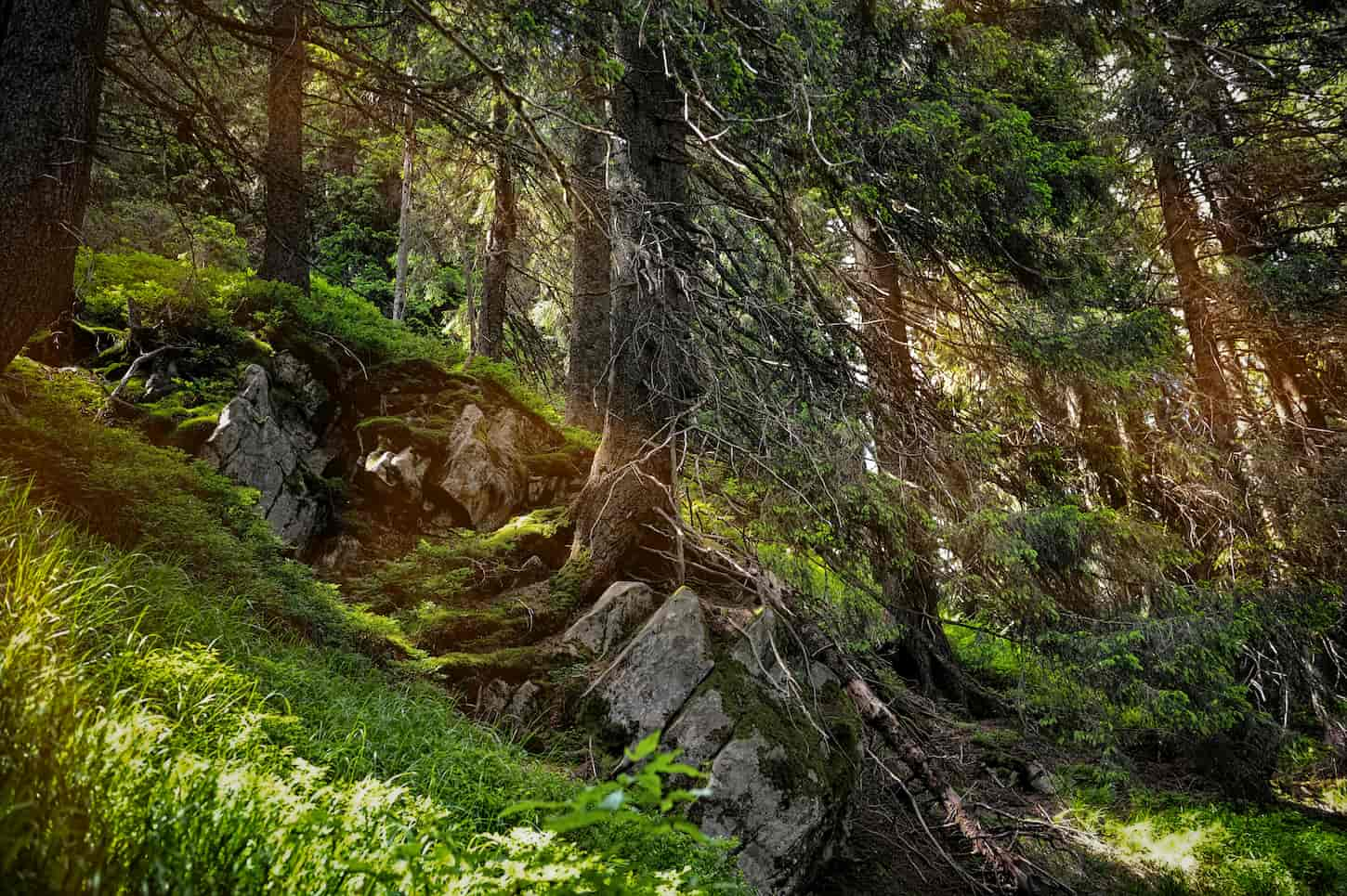Finding out about your last name is cool. But what if your family’s name has ties to nature? Can that help you learn about where you’re from or how your family took up that nature-based last name?
Last names that come from nature can give clues to where a family comes from, where they lived, and what their occupation may have been. Nature-based surnames are rare and have an amazing history behind them that should be researched and appreciated.
Ready to know more about nature-based family names? Let’s talk about 15 of the most common last names that come from nature – and some probable origin stories for them.

Last Names from Nature
Origin stories are, without a doubt, a fascination for all of us. This is true whether we’re into reading about how our favorite fictional characters develop superpowers or we’re trying to learn more about how our family’s last name came into being.
So let’s look at 15 (okay, it’s more than 15 if you include the variations we’ve included below) of the most common surnames that come from nature and general geographical locations (that qualify as nature).
| Family Name | Country of Origin | Meaning | Origin Story Examples |
|---|---|---|---|
| Moore | Middle English | An uncultivated piece of land preserved for some particular reason. Synonyms and related surnames: moor, marsh, fen, heath. | Moore’s and Marshes may have lived in or near an open piece of land. |
| Hill | English | A naturally raised area of land (although not as tall or rocky as a mountain). | Hills may have lived on or near a prominent raised piece of land in an area. |
| Flores | Spanish | Spanish for flowers, a seed-bearing plant that blooms. To be in reach of an optimum stage of development and fully developed. | The first Flores may have been a high-level performer in their field. |
| Green | English | Of the color, or a piece of common grassy land. | Greens may descend from people who lived near the village green or a notable grassy area. |
| Rivera | Spanish, Italian | Riverbank, or the area alongside the river (usually referring to the land). | The first Rivera’s may have lived next to a river or even along the shores (the rivers’ bank). |
| Reed | English | A tall, slender plant that may grow in a woodland clearing or in a marshy area. | The first Reeds may have been neighbors to the first Marsh and Moore families. |
| Ramos | Spanish, Portuguese | Branches or bouquets of something, sometimes specifically an olive branch. This is also a common thing to call an area with thick woods. | The Ramos surname may have been first given to a family who lived in a particularly wooded area full of branches. |
| Brooks | Swedish, English | A stream or brook. | The Brooks family may have lived next to a notable stream that was important to the town. |
| Wood | English, Scottish | A wood or forest. | The first Woods may have lived next to the forest. Variations could include specific types of trees or woods. |
| Mendoza | Spanish | A cold mountain. | This surname was probably given to people who lived atop a mountain known for its colder peaks. |
| Ross | Gaelic, Scottish | Ross is a region of Scotland and is a former section of land. It can also mean headland, peninsula, moor, bog, or valley. | The first Ross families may have come from Ross or from any number of headlands, peninsulas, or valleys. |
| Lee | English | A meadow or clearing near the woods. Lee may also refer to the wind-sheltered side of something. | The Lees (or Leighs) may have first lived in a clearing by the woods. |
| Shaw | English, Scottish | A copse, thicket, visible part of a cultivated crop (usually potatoes or turnips), or a wolf (probably related to the Old English and Norse sceaga/skegg which meant beard). | The first Shaws may have lived near the woods, where they were turnip farmers. |
| Murray | Scottish, Irish | A seaside settlement or a transliteration of the district Moray in Scotland. | The first Murray family may have lived near the sea. Clan Murray descends from the Morays. |
| Holmes | English | Holm is an islet or flat ground near water. Holmes may become submerged in a flood. | The first Holmes may have lived next to a river or other watery area prone to flooding. |
Now, we didn’t include every possible definition for each surname. That would turn this article into a heavily detailed and intense book. But when we dig into the meaning of each of these to some degree? That gives us a good idea about the history and origin story behind each of these nature-based family names.
As for the origin stories, they aren’t super detailed here, either. That’s because the Holmes family from Northern England’s origin story may have some different details than would the Holmes from Eastern England. However, both families adopted that same surname due to their islet (or river’s) tendency to become submerged.
How Common Are Surnames from Nature?
Surnames from nature aren’t the most popular names in the world. They aren’t even the second most common surnames in the world. They are, in fact, some of the less common last names in existence. But that’s okay – they’re still really cool.
But let’s take a quick step back and look at the ways that last names developed in history. There are generally a handful of ways (and a few subcategories) that last names are generally developed. We’ve tried to list them in order of how common or popular they are.
- Occupational family names – the village blacksmith may be referred to as (whatever their first name was) Smith.
- Relationship-based surnames.
- Patronymic surnames – Johan’s son Eric becomes known as Eric Johanson.
- Patronage to honor the patron’s name. Kilpatrick is Patrick’s follower.
- Where you lived or a place name:
- Based on a description of the natural area around them.
- From a famous estate name (like the Windsor family).
- Based on a prominent geographical location.
- Personal or common familial characteristics that stuck as the last name.
So, the simple fact is this: nature-based family names aren’t the most common last names. They do exist, and they’re pretty cool – and they have some remarkable history behind them.
No matter what your last name is, be proud of your family’s heritage. Because your family, no matter how common (or uncommon) its surname is, has some remarkable history. Next, make sure you read our post on why some surnames are so frequently found (and why others are rarer). In that post, we’ll show you the ten most common family names in the world.
Final Thoughts on Nature-based Surnames
Surnames are pretty cool – no matter their origin. Nature-based family names are included in that coolness factor. Again, not everyone will have a natural or geographically-based surname. And that’s okay. Only half of our team has a nature-based surname.
Breanne’s married last name is one based on a personal characteristic that means “bald.” But don’t worry – she doesn’t have that family trait. She did marry into that legacy, after all!
Her maiden last name, on the other hand, is patronymic and is full of its own rich history. But both surnames are full of stories, history, and people worth knowing.
My married surname means star (big surprise, huh?). It can also mean stubborn, stark, or a ton of other things – including a personal description of someone. Maybe they had a weird, star-shaped birthmark. Could it qualify as a nature-based last name? Definitely. Perhaps the first Starrs lived in a place with some great star-gazing.
My maiden name also qualifies as a nature-based family name. My ancestors lived next to a hill with a waterfall on it. I haven’t found that particular geographical location yet, but I’m working on it.
All four of these family names are amazing and full of their own rich, varied histories. And each story is worth learning. So no matter what surname you’re studying, look up its history. Use that to help you find your ancestors’ stories – and then understand your own story that much better.
Resources
When learning about genealogy, it’s important to learn from various reputable sources. These are the sources used in this article and our research to be more informed as genealogists.
- Finley, Sarah. “The 7 Different Types of English Surnames Revealed.” GoodtoKnow, 2 Mar. 2018, goodtoknow.co.uk/family/types-of-english-surnames-101541.
- Powell, Kimberly. “Top 100 Most Common Last Names in the United States.” ThoughtCo, 2020, thoughtco.com/most-common-us-surnames-1422656.
- “Surnames Ranking – UK Surname Map.” Surname Map UK, surnamemap.eu/unitedkingdom/surnames_ranking.php.

